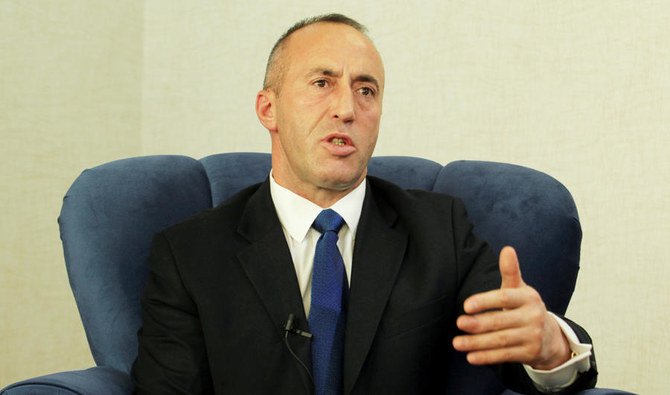Kosovo PM resigns after being called to war crimes court

Kosovo Prime Minister Ramush Haradinaj, a wartime commander of the Kosovo Liberation Army (KLA), said Friday he has resigned after being called as a suspect before a war crimes court in The Hague.
“I received a summons from the special court as a suspect and was offered to go as the prime minister or as an ordinary citizen of Kosovo. I chose the latter,” Haradinaj, 51, told reporters.
He added that he will be questioned “next week.”
The EU-backed court based in The Hague was set up in 2015 to try war crimes allegedly committed by the ethnic Albanian KLA separatists, notably against Serbs, Romas and Kosovo Albanian political opponents during and after the 1998-99 war.
“Responsibility now goes to the president to start consultations to set the date of the (general) election. I will offer myself to the people again to get their trust. I am not accused, but (will be) questioned” by the court, said Haradinaj, visibly shaken after a government meeting.
“The government of the country continues to perform its functions without creating a vacuum,” he added.
According to the constitution, after the prime minister’s resignation, the government is a technical body performing regular duties until a new one is elected.
President Hashim Thaci could nominate a prime minister in consultation with Haradinaj’s ruling coalition to form a new government, but if that fails he must call early elections.
“I respect his (Haradinaj’s) decision and as President of the Republic of Kosovo assure you that I will act based on my constitutional and legal competences and the citizens of Kosovo will be informed of any decisions I make in good time,” Thaci said on Facebook.
According to the president, several other former KLA officers were also summoned, including his adviser Bislim Zyrapi, wartime KLA’s chief of staff.
The resignation comes amid growing tensions with Serbia as the EU-mediated dialogue between Pristina and Belgrade has been in stalemate for months.
In Belgrade, the chairman of Serbian parliament’s Committee for Kosovo, Milovan Drecun, said Haradinaj’s resignation could pave the way to resuming the dialogue.
“Haradinaj has become an insurmountable obstacle for any further talks between Belgrade and Pristina,” Drecun told Beta news agency.
He pointed to Haradinaj’s refusal to abolish the 100 percent tax on goods from Serbia, introduced in November, which Belgrade has set as the condition for restarting the dialogue.
Serbia refuses to recognize Kosovo’s independence, but has agreed to discuss a possible binding agreement on ties with its former province.
The agreement is required for both Pristina and Belgrade if they want to progress on their path to an EU membership.
This is the second time that Haradinaj has resigned after being summoned by a war crimes court.
He was acquitted in 2008 — the same year Kosovo unilaterally declared its independence from Serbia — and again in 2012 after a retrial was ordered owing to allegations of witness intimidation in the first case.
In an interview with AFP in January, Haradinaj said Kosovo would respond to all the court’s demands.
In mid-January, the special court began interrogations of several ethnic Albanian guerrillas in The Hague, including two other former top KLA officials, Rrustem Mustafa-Remi and Sami Lushtaku.
Kosovo media believe that first indictments are likely to be issued this year.
The tribunal was created following a 2011 Council of Europe report that accused the KLA of the kidnapping and disappearance of 500 civilians, mostly ethnic Serbs and Roma but also ethnic Albanian political opponents.
The Kosovo war — the last conflict in the former Yugoslavia — claimed more than 13,000 lives. It ended after a NATO air campaign forced out the Serbs and put Kosovo under UN protection.
More than 10,000 of the dead were ethnic Albanians, almost 2,300 were Serbs and Montenegrins and the remainder included a few hundred Romas.
